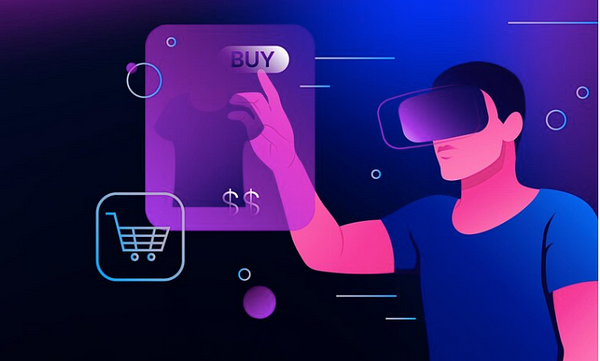In today’s rapidly evolving tech landscape, the metaverse has emerged as a revolutionary concept, blurring the lines between imagination and reality. As industries embrace the potential of the metaverse, e-commerce stands out as a significant beneficiary. In this blog post, we will explore the convergence of the metaverse and e-commerce, shedding light on the transformative impact this fusion can have on the future of online shopping.

E-commerce and the metaverse are reshaping the industry, with early adopters such as Warby Parker integrating AR technology into their business to provide customers with immersive experiences. This is just the beginning of the metaverse’s impact on e-commerce.
Innovative e-commerce brands are seamlessly melding digital and physical experiences, allowing users to fully immerse themselves in digital environments. Cutting-edge technologies and a focus on user experience have facilitated this integration, enabling users to seamlessly interact with digital tools in physical spaces and vice versa.

Retailers are leveraging the rise of the metaverse to introduce innovative strategies that enhance the online shopping experience, including personalized recommendations and improved delivery options. These advancements are reshaping e-commerce as we know it.
The adoption of augmented reality (AR) and virtual reality (VR) is on the rise as enterprises seek to offer immersive buying experiences. To propel e-commerce into the future aligning technology with the metaverse is crucial. By integrating AR/VR with the metaverse, enterprises can create a seamless, interactive and immersive online shopping experience. The metaverse promises a personalize immersive online shopping experience available 24/7. Research suggests that a significant portion of consumers will be spending time in the metaverse for various purposes, including shopping and entertainment.
E-commerce’s role in the metaverse and vice versa has grown significantly allowing users to preview products and services before making online purchases. Many e-commerce businesses are leveraging metaverse development services to enhance customer engagement and satisfaction while driving sales.
The Metaverse Unveiled:
The concept of the metaverse, once confined to science fiction has transcended fantasy to become a collective virtual shared space that blends physical and virtual reality. This digital universe allows users to engage with computer-generated environments and interact with others in real-time.

E-Commerce in the Metaverse:
The e-commerce sector is at the forefront of embracing the metaverse, recognizing its potential to revolutionize online shopping. A future where customers can step into virtual storefronts, interact with 3D product environments and make purchases in a dynamic, immersive setting is on the horizon.

Immersive Shopping Experiences:

The integration of the metaverse into e-commerce opens avenues for immersive shopping experiences. Virtual reality (VR) and augmented reality (AR) technologies empower customers to virtually try products, visualize items in their spaces and embark on personalized and engaging shopping journeys.
Virtual Storefronts and Marketplaces:
Metaverse-based platforms enable businesses to establish virtual storefronts and marketplaces, offering dynamic and interactive environments for customers to explore products, connect with brands and make informed purchasing decisions. Visual displays within the metaverse enhance the overall shopping experience.
Decentralized Commerce and Digital Assets:

Blockchain technology, foundational in many metaverse ecosystems, introduces decentralized commerce, enabling secure and transparent transactions. Within the metaverse, the use of digital assets creates new opportunities for ownership and trade, fostering trust and reducing reliance on traditional intermediaries.
Some benefits that will change the whole ecommerce industry are as follows:
· Easy transactions

The integration of metaverse elements in e-commerce streamlines transactions, ensuring a seamless and user-friendly purchasing process for customers.- The integration of the metaverse in eCommerce has revolutionized the conduct of online transactions. The utilization of cryptocurrency and e-wallets has facilitated seamless transactions between sellers and buyers in the online marketplace. One significant advantage of engaging with digital currency in a metaverse-based eCommerce business is the absence of the need to link the crypto account with the user’s real-world banking. Moreover, the transparency afforded by the metaverse in online transactions enables users to obtain proof of their virtual purchases, thereby enhancing overall engagement.
· Personalized Experiences

Tailored customer experiences play a crucial role in decreasing cart abandonment rates. Providing a personalized virtual experience enables customers to customize their search by interacting with consumer avatars, empowering them to confidently explore products and make informed decisions. Implementing this high-quality personalization technique in metaverse-based eCommerce businesses boosts overall customer engagement and fosters loyalty.
· Storytelling Advancements
The metaverse platform is ideally suited for storytelling, a critical element in creating awareness and establishing brand identity. Through the use of artificial intelligence, virtual reality, and other advanced technologies, businesses can fully immerse their audience, transforming them from passive observers to active participants who can experience stories in real time. Additionally, organizing virtual events such as concerts in a virtual universe provides a complete VR experience.

· Enhanced Return on Investment (ROI)
According to a Google survey, over 66% of online shoppers utilize AR tools to simplify their decision-making process. This leads to heightened user satisfaction as it enables them to explore and test products in a 3D format. With the expansion of eCommerce in the metaverse ecosystem, customers will have even greater visualization capabilities and the ability to interact with online shop assistants, providing an immersive shopping experience that ultimately leads to increased ROI.

Challenges and Considerations:
While the metaverse presents vast potential for transforming eCommerce, businesses must navigate challenges such as data privacy, security concerns, and the need for standardized protocols. Additionally, ensuring accessibility and inclusivity in the metaverse is crucial for creating a positive and equitable virtual shopping environment.
As the metaverse continues to evolve, eCommerce stands on the brink of a groundbreaking transformation. Embracing the metaverse enables businesses to redefine the online shopping experience, offering customers a more immersive, interactive and personalized journey. The convergence of technology and commerce in the metaverse signifies a paradigm shift, and those who adapt and innovate are poised to lead the way into the future of eCommerce.
#metaverse #ecommercemetaverse #web3.0 #virtualeality #augmentedreality #virtualshopping





